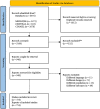Instruments to assess post-intensive care syndrome assessment: a scoping review and modified Delphi method study
- PMID: 37936249
- PMCID: PMC10629074
- DOI: 10.1186/s13054-023-04681-6
Instruments to assess post-intensive care syndrome assessment: a scoping review and modified Delphi method study
Abstract
Background: The assessment of post-intensive care syndrome (PICS) is challenging due to the numerous types of instruments. We herein attempted to identify and propose recommendations for instruments to assess PICS in intensive care unit (ICU) survivors.
Methods: We conducted a scoping review to identify PICS follow-up studies at and after hospital discharge between 2014 and 2022. Assessment instruments used more than two times were included in the modified Delphi consensus process. A modified Delphi meeting was conducted three times by the PICS committee of the Japanese Society of Intensive Care Medicine, and each score was rated as not important (score: 1-3), important, but not critical (4-6), and critical (7-9). We included instruments with ≥ 70% of respondents rating critical and ≤ 15% of respondents rating not important.
Results: In total, 6972 records were identified in this scoping review, and 754 studies were included in the analysis. After data extraction, 107 PICS assessment instruments were identified. The modified Delphi meeting reached 20 PICS assessment instrument recommendations: (1) in the physical domain: the 6-min walk test, MRC score, and grip strength, (2) in cognition: MoCA, MMSE, and SMQ, (3) in mental health: HADS, IES-R, and PHQ-9, (4) in the activities of daily living: the Barthel Index, IADL, and FIM, (5) in quality of life: SF-36, SF-12, EQ-5D-5L, 3L, and VAS (6), in sleep and pain: PSQI and Brief Pain Inventory, respectively, and (7) in the PICS-family domain: SF-36, HADS, and IES-R.
Conclusion: Based on a scoping review and the modified Delphi method, 20 PICS assessment instruments are recommended to assess physical, cognitive, mental health, activities of daily living, quality of life, sleep, and pain in ICU survivors and their families.
Keywords: Activities of daily living; Cognitive function; Mental illness; Physical function; Post-intensive care syndrome; Quality of life.
© 2023. The Author(s).
Conflict of interest statement
The authors declare that they have no competing interests.
Figures


References
-
- Nakanishi N, Liu K, Kawakami D, Kawai Y, Morisawa T, Nishida T, Sumita H, Unoki T, Hifumi T, Iida Y, et al. Post-Intensive Care Syndrome and its new challenges in coronavirus disease 2019 (COVID-19) pandemic: a review of recent advances and perspectives. J Clin Med. 2021;10(17):3870. doi: 10.3390/jcm10173870. - DOI - PMC - PubMed
-
- Kawakami D, Fujitani S, Morimoto T, Dote H, Takita M, Takaba A, Hino M, Nakamura M, Irie H, Adachi T, et al. Prevalence of post-intensive care syndrome among Japanese intensive care unit patients: a prospective, multicenter, observational J-PICS study. Crit Care. 2021;25(1):69. doi: 10.1186/s13054-021-03501-z. - DOI - PMC - PubMed
-
- Hatakeyama J, Inoue S, Liu K, Yamakawa K, Nishida T, Ohshimo S, Hashimoto S, Kanda N, Maruyama S, Ogata Y, et al. Prevalence and risk factor analysis of Post-Intensive Care Syndrome in patients with COVID-19 requiring mechanical ventilation: a multicenter prospective observational study. J Clin Med. 2022;11(19):5758. doi: 10.3390/jcm11195758. - DOI - PMC - PubMed
-
- Mikkelsen ME, Still M, Anderson BJ, Bienvenu OJ, Brodsky MB, Brummel N, Butcher B, Clay AS, Felt H, Ferrante LE, et al. Society of Critical Care Medicine's international consensus conference on prediction and identification of long-term impairments after critical illness. Crit Care Med. 2020;48(11):1670–1679. doi: 10.1097/CCM.0000000000004586. - DOI - PubMed
Publication types
MeSH terms
Supplementary concepts
LinkOut - more resources
Full Text Sources
Medical

